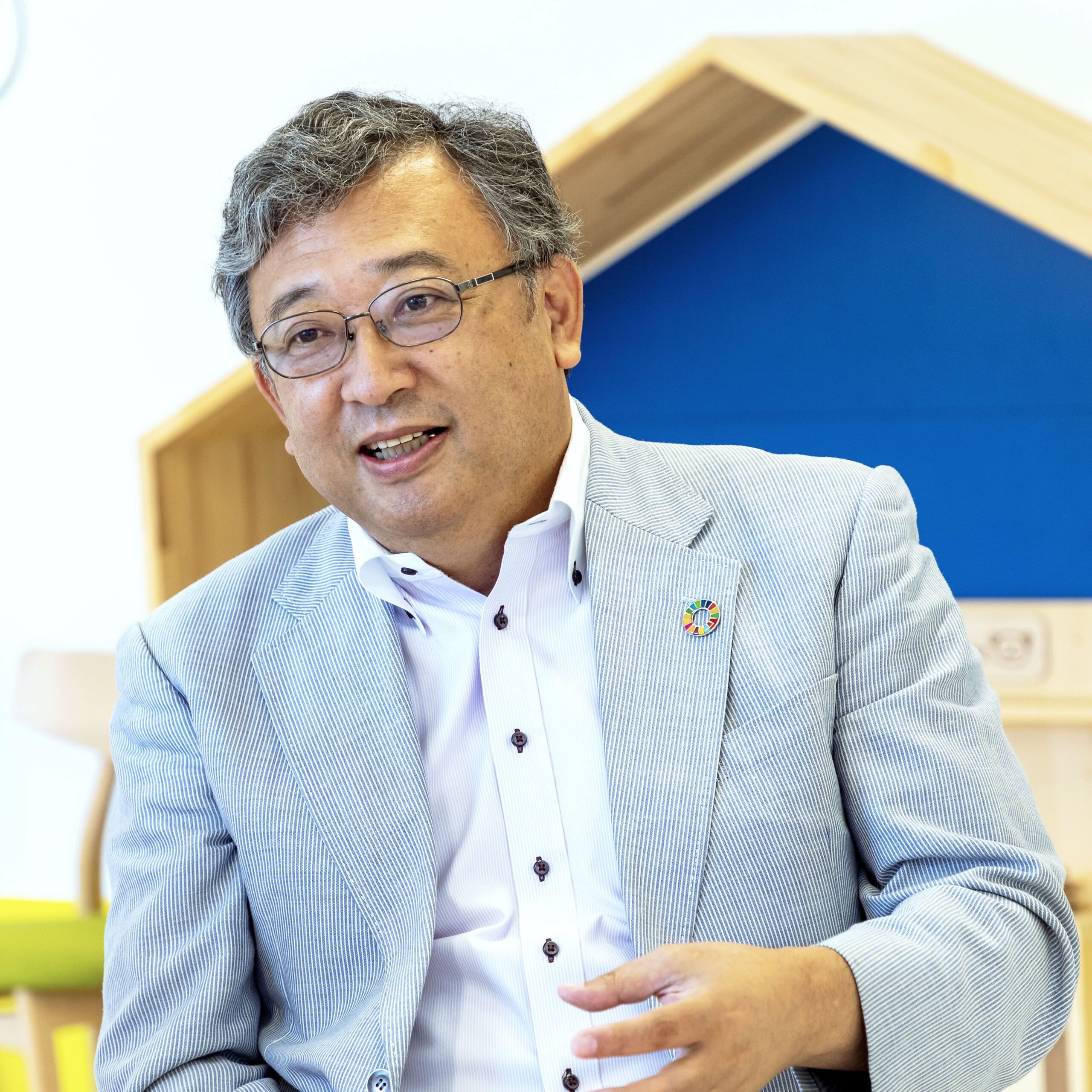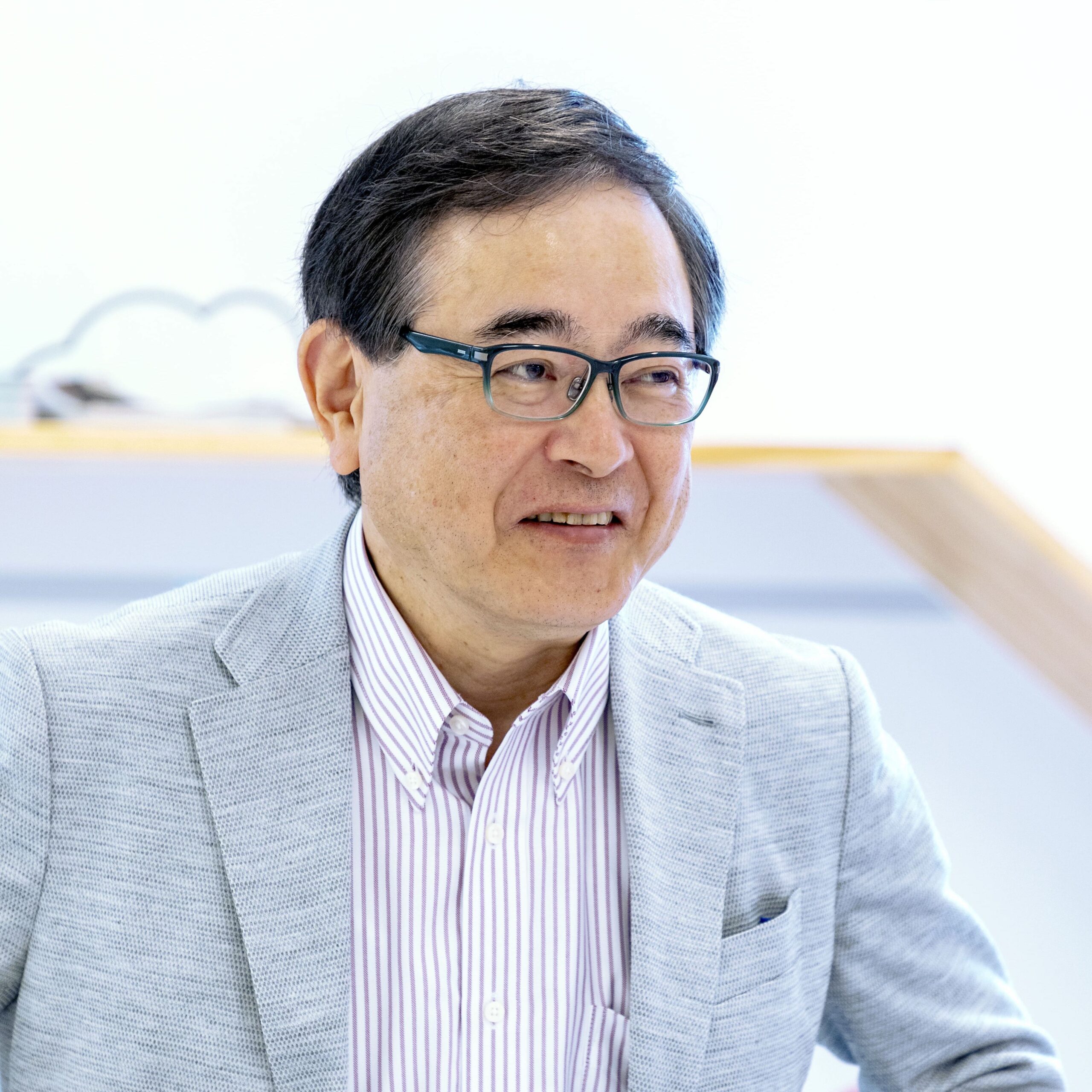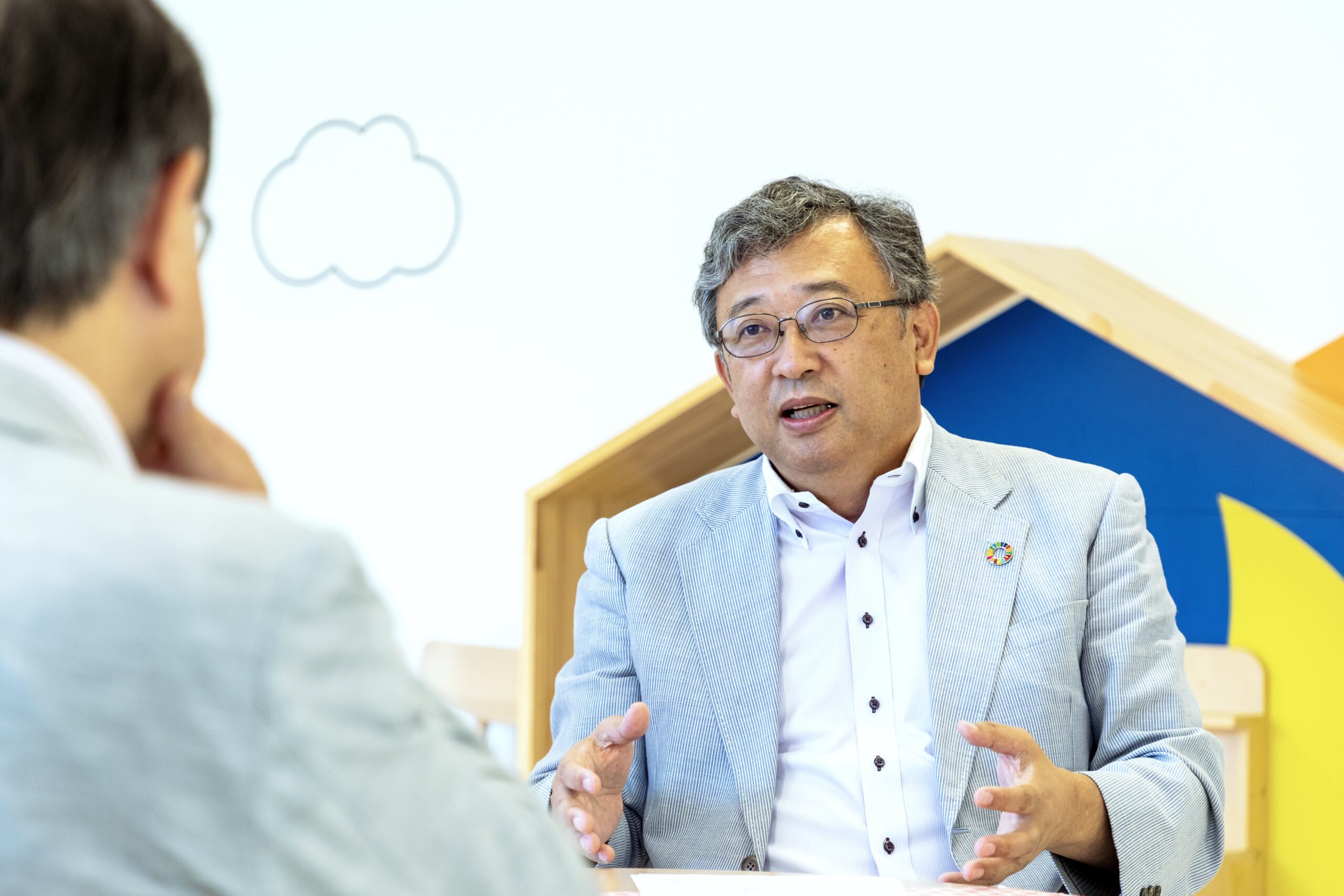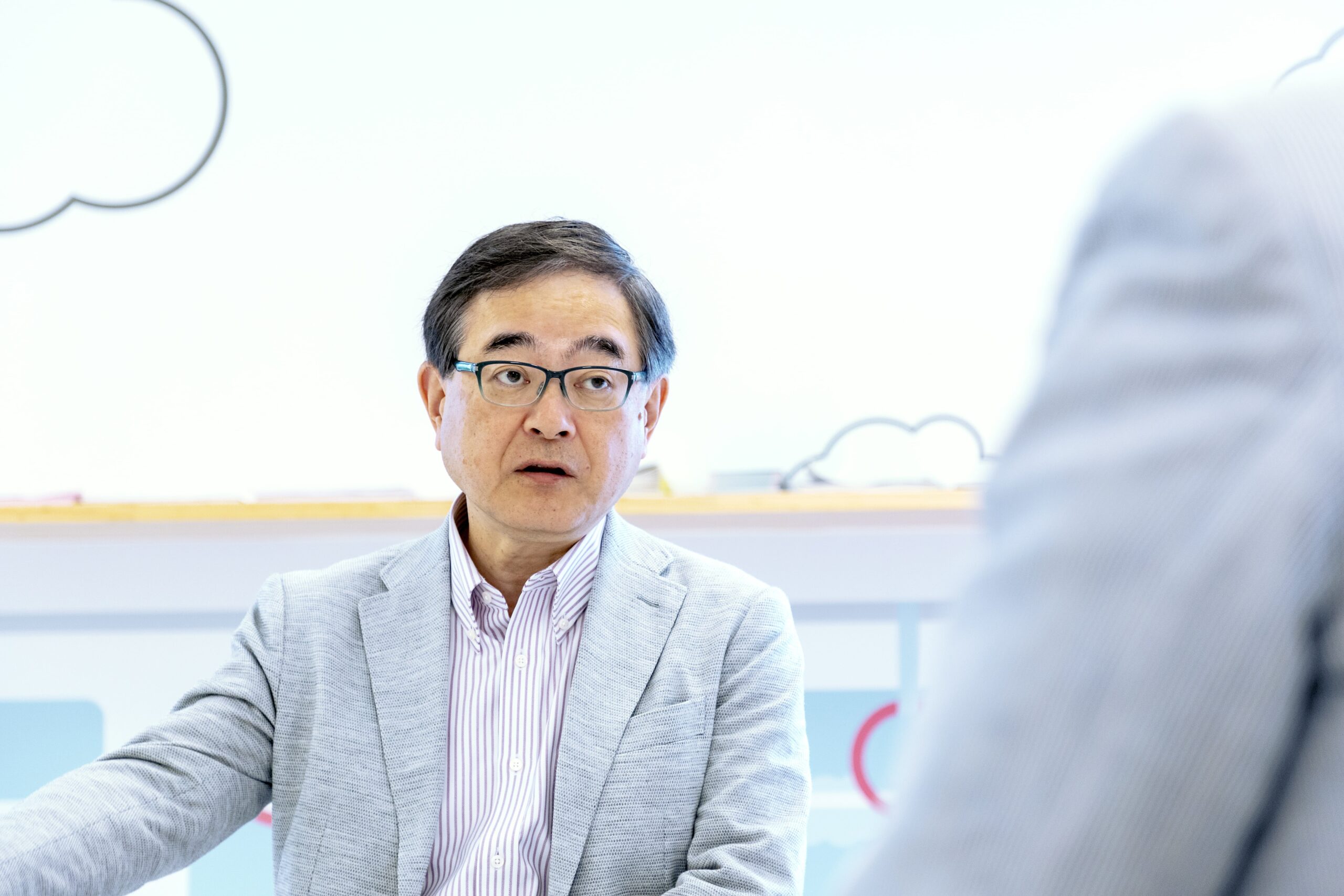Striving to help create an affluent future society through local contributions with a global mindset
University News | January 19, 2022
This article was published in the Autumn 2021 issue of Litterae Populi. The full issue can be found here.
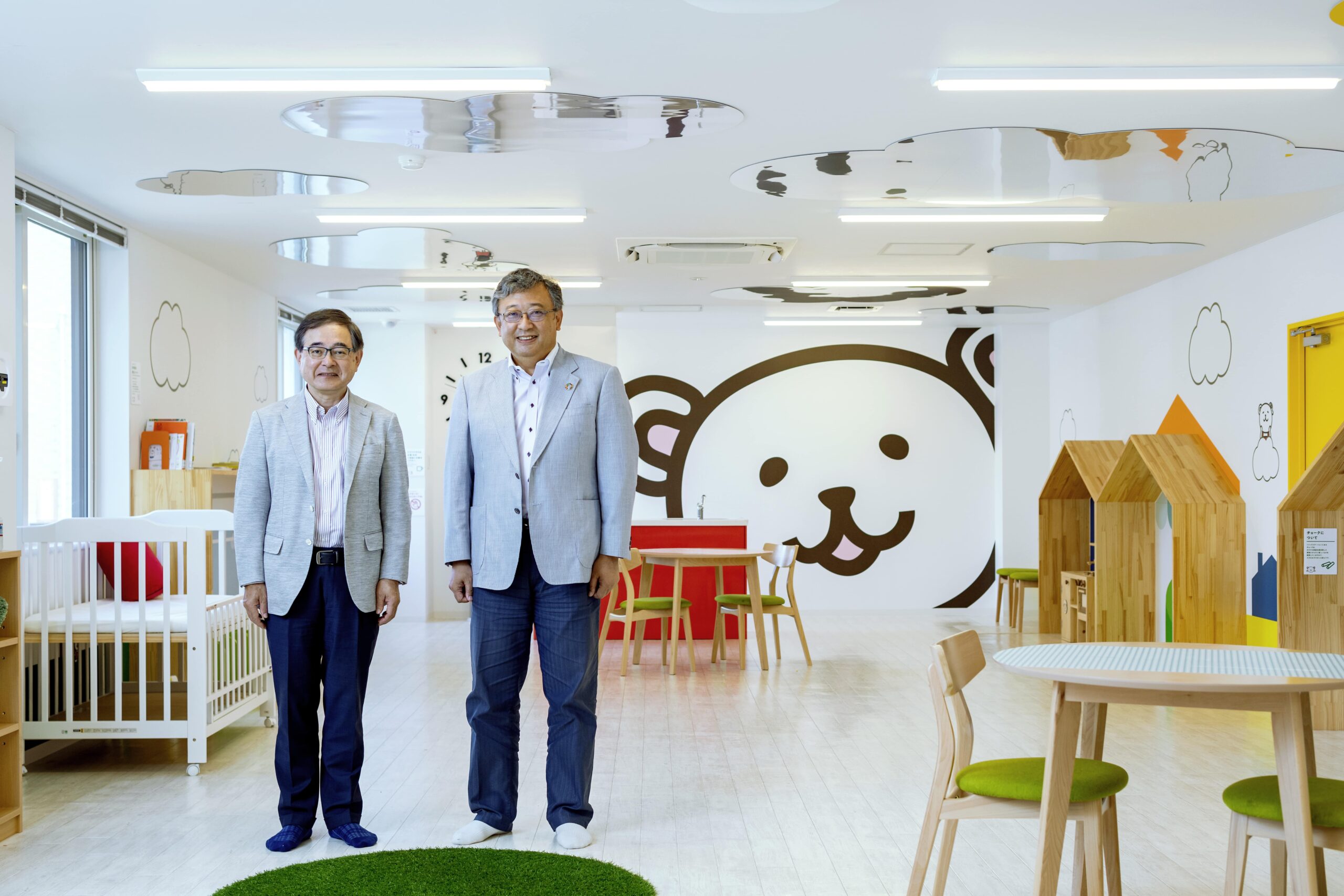
Hokkaido University president, Kiyohiro Houkin (left), CEO and president of Co-op Sapporo, Hideaki Omi (right).
Founded in 1965, Co-op Sapporo runs more than 100 stores across Hokkaido. It has worked to address regional problems as it plays a part in Hokkaido’s food infrastructure. With “Connection” as its catchword, Co-op Sapporo runs various businesses to safeguard the daily lives of local residents, including store, home delivery, and energy businesses. Dr. Kiyohiro Houkin, who will soon celebrate the first anniversary of his inauguration as President of Hokkaido University, asked Mr. Hideaki Omi, CEO and president of Co-op Sapporo and a Hokkaido University alumnus, about the philosophy and ethos of the company and his expectations for the University, among other topics.
- Hideaki Omi (Guest)
-
CEO and President, Co-op Sapporo
Born in Aichi Prefecture in 1958, Hideaki Omi received a bachelor’s degree from the Faculty of Education, Hokkaido University. Since joining the Consumers’ Cooperative Co-op Sapporo (the present day Co-op Sapporo) in 1982, he has held several positions including the general manager of the Renewal Headquarters, director of the Fisheries Department and general manager of the Product Headquarters. In 2006, he became a managing director. He has been CEO and president since 2007.
- Kiyohiro Houkin (Interviewer)
-
President, Hokkaido University
Born in Hokkaido in 1954. Graduated from Hokkaido University School of Medicine. Doctor (medicine) (Hokkaido University). Worked for Hokkaido University Hospital and other facilities since 1979. After working as a visiting researcher at the University of California, Davis, became an assistant professor at the Hokkaido University Graduate School of Medicine in 2000, professor of Sapporo Medical University School of Medicine in 2001 and professor of the Hokkaido University Graduate School of Medicine in 2010. After becoming the director of Hokkaido University Hospital/ vice executive of Hokkaido University in 2013 and the director of Hokkaido University Hospital/vice president of Hokkaido University in 2017, assumed the present position in October 2020.
Student days of trial and error
Houkin: Please tell us about yourself, from your boyhood days to your entrance into Hokkaido University.
Omi: I was born in Anjo City, Aichi Prefecture. My father worked for Toyota Motor Corporation, and my mother for an agricultural cooperative. When I was in my second year at Kariya Senior High School, I had the opportunity to attend a lecture by Mr. Shigehiko Toyama, an alumnus of the school who is known for his book Shiko no Seirigaku (Organizing of Thoughts). The book, originally printed in 1983, has been perennially popular. In fact, it caused a buzz in the 2000s for being a favorite of students at the prestigious Tokyo University and Kyoto University.
Houkin: It’s a famous book. I guess nearly three million copies have been published.
Omi: Exactly. The lecture took place before Toyota launched its business in the United States. Naturally, the lecture included topics about Japanese companies, and to my amazement, he said, “You should get out of Mikawa, a rural backwater. If you stay in the Tokai region, you’ll never be able to develop a sense of globalism and broaden your knowledge. So, forget about going to Nagoya University.”
Houkin: Nagoya University attracts many students from three prefectures in the Tokai region, doesn’t it?
Omi: That’s right. But after attending his lecture, I decided to go to Hokkaido University, a national university particularly far from the Tokai region. I made the decision inspired by his lecture, but in hindsight it was too simple a motive.
Houkin: What was your major at Hokkaido University?
Omi: Since I loved physics and math, I took the entrance exam in the science category and enrolled. I initially aspired to become an architect, but my grades were a little short of what was required to proceed to the relevant faculty, so I entered the Department of Forest Products in the Faculty of Agriculture, only to find myself uninterested in that major. I have no idea why I did this, but I transferred to the Faculty of Education.
Houkin: Was that possible? That was a complete U-turn.
Omi: Yes, it was possible. At that time, there were eight times as many applicants as the transfer slots, but I was able to pass the exam and I pursued my studies at the Faculty of Education. I conveyed my desire to remain within academia to the head professor of the department where I was at that time, but he said I should enter business instead of remaining at the university. By then, however, all the recruitment exams in the private sector had been closed, and as it happened, my participation in a Hokkaido University Co-op activity led to my landing a job at Co-op Sapporo.
A collective that caters to the needs of society
Houkin: The professor must have had excellent foresight. Could you tell us about Co-op Sapporo today, including its businesses?
Omi: Today, we do about 300 billion yen in retail business: about 200 billion yen in store business and about 100 billion yen in home delivery business.
Houkin: Is the home delivery business truly worth 100 billion yen by itself?
Omi: Yes, it is. I expect home delivery to be among our core businesses going forward. We also operate an energy business. In fact, the Co-op Sapporo Group consists of 21 affiliates, including a travel agency and Co-op Foods, a company that produces and sells ready-to-eat dishes. All these affiliates have been profitable over the past five years or so. Because food and energy are related business areas, we’ve given precedence to serving as the food infrastructure of Hokkaido. The fact is that the Consumer Cooperatives Act stipulates that co-ops can sell only to their members. The Act prevents us from accepting business offers we receive from various places. We have our affiliates launch businesses so as not to violate the law.
Houkin: Your home delivery business, in particular, has achieved huge growth.
Omi: Today, over 420,000 households across Hokkaido are using our delivery service. That’s one in every seven households. Our goal is to increase our users to over 500,000 households in three years. Our strength lies in our ability to help those living in “food deserts,” because their numbers are rising in today’s aging society.
Houkin: Do you use outsourcing for deliveries? When did you begin your delivery service to individual homes?
Omi: We deliver on our own. The Todok Station where we are now (home delivery Todok Nishioka Center) has more than 30 trucks, with each truck delivering to about 80 households per day. Co-op Sapporo launched delivery service to individual homes in 2007. Before that, the group purchasing system was the mainstream-a system where groups of three families, for example, jointly purchase products and pick up their respective orders after all the orders for the group are delivered to one of the families. When a co-op in Tokyo scrapped this system, we followed in their footsteps and switched to an individual delivery service, because no further growth was expected if the situation remained unchanged.
Houkin: Did you ever have difficulty promoting the idea of a service that delivers to individual homes?
Omi: We put a great deal of effort into the branding in order to make it the most recognizable individual home delivery brand in Japan. To convey a clear, precise message about our service of delivering to individual homes, we used a major advertising company for the branding. The company came up with the name “Todok” for the service. We chose a polar bear as the mascot, because in the summer of that year Asahiyama Zoo in Asahikawa City attracted more visitors than any other zoo in Japan owing to their highly popular Polar Bear Aquatic Park.
Houkin: Co-op Sapporo has great public relations strategies, not to mention its business ideas. A homophone of the Japanese word todoku (to deliver), Todok is now synonymous with your home delivery service. This shows the level of enthusiasm and dedication your staff have had for the service. I think home delivery is also in demand among families with small children. What do you think?
Omi: Exactly. In fact, we also have a special program for child-rearing families. I believe early childhood education is pivotal to eliminating poverty. Thinking that picture books are the first educational tool used by parents, we annually provide four picture books free of charge to our members with children of one or two years old. This initiative has continued for about 10 years. We’ve also worked with the Finnish government. Finland and Hokkaido share several similarities, including population. When I visited the country, I learned about their baby box (maternity package) program. The government sends a complimentary kit of newborn necessities worth 30,000 yen to new mothers. Wondering if Co-op Sapporo could do something similar for our members, we decided to launch our own baby box program based on the advice from the local Finnish consulate. All the clothes used for our baby boxes are made in Finland, whereas all the consumables are provided by Japanese companies.
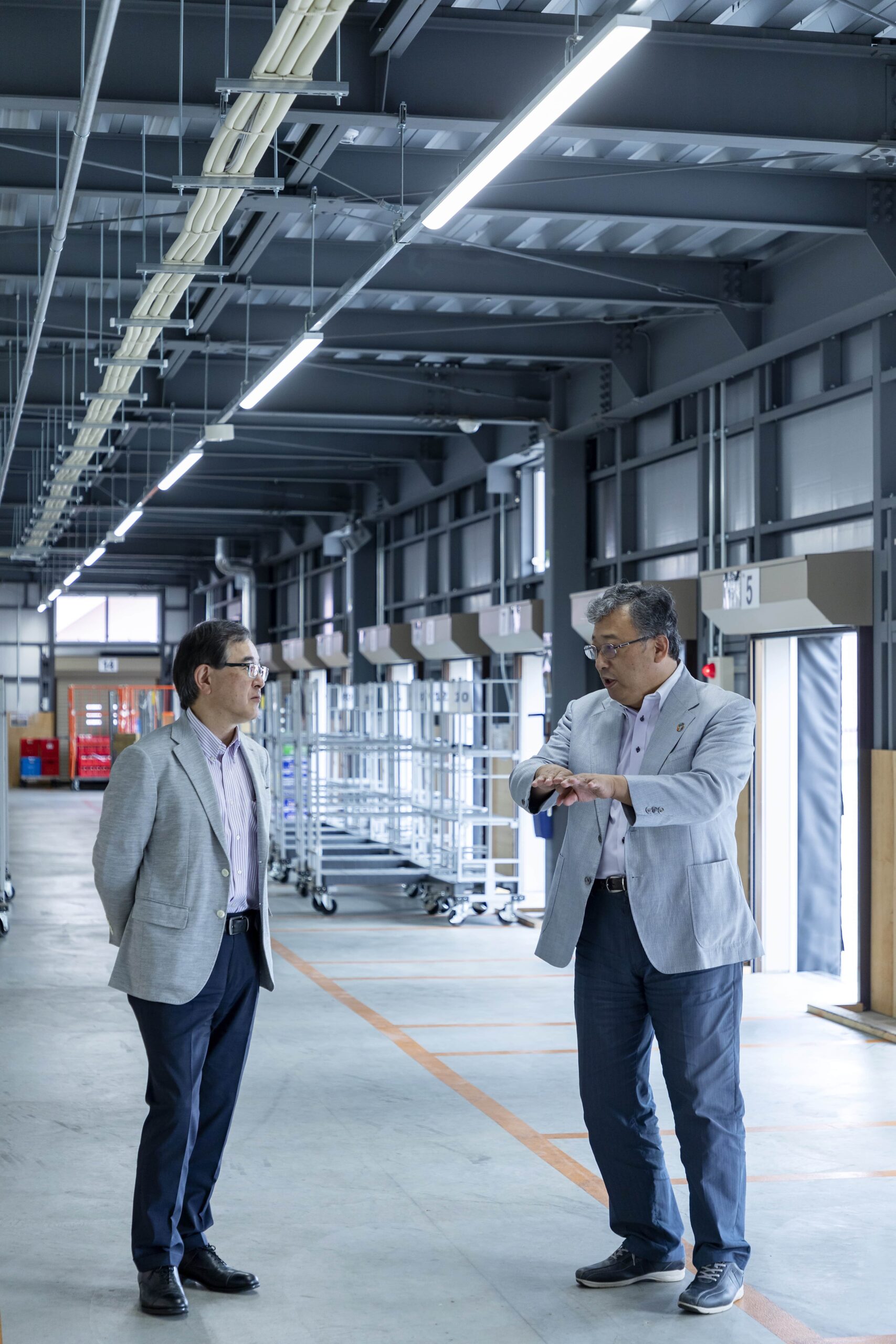
Hokkaido University president, Kiyohiro Houkin (left), CEO and president of Co-op Sapporo, Hideaki Omi (right).
Houkin: As a community-based collective, Co-op Sapporo has been engaged in various initiatives from a global perspective.
Omi: These initiatives are well-known in society, and half of households with children have become members. This makes me optimistic about passing our businesses on to future generations despite a shrinking population caused by a declining birthrate. Todok Stations provide space for members to let their children play as they like, take part in events that provide useful information for daily life, or just drop by. We have 20 such stations across Hokkaido, they include communication spaces for parents.
Looking ahead to the next generation
Houkin: Co-op Sapporo has also been working diligently on the SDGs.
Omi: Consumers, who are members of the community, must come up with ideas on how to improve their community and must implement those ideas. Otherwise, the co-op business would never work. In other words, every daily activity of a co-op is related to an SDG. We always take the next generation into consideration.
Houkin: I regret to say that some companies engage with the SDGs simply because they’re fashionable. In contrast, the idea of Co-op Sapporo itself represents the SDGs.
Omi: That’s right. For instance, most of the picture books and toys at this Todok Station were donated by our members. None of them were bought using business expenses. We also allow members to exchange items for a token fee. These fees are saved to buy wooden toys and other necessities at the Todok stations. We also promote resource recycling. By recovering resources during delivery, we don’t consume extra energy. When we incorporate business in our life structure with the cooperation of our members, we can produce results that benefit all our members. This is what the slogan “One for all, and all for one” is all about.
Houkin: Is there anything that you feel has changed significantly since the pandemic began?
Omi: I don’t think that all daily activities of people have been reset, but 20 to 30 percent of those activities have been, and I think that different behavioral patterns will emerge in the post-COVID-19 era. Staying home reduces CO2 emissions. Experiencing the COVID-19 pandemic is also related to the SDGs. In terms of business, I feel that our home delivery business has grown at an accelerated pace in the past year and a half. The pandemic, which has forced people to stay home and shop online or by catalog, is probably the main driver of the accelerated growth.
Houkin: Finally, what message would you like to leave to our students?
Omi: I’d like students to have a global perspective. I hope they’ll visit the front line of various fields and stay inspired.
Houkin: That’s a very important message. I think I’ll give another serious thought to the internationalization of Hokkaido University based on my experience of the effects of the COVID-19 pandemic. Thank you for sharing your valuable time today.
This article was published in the Autumn 2021 issue of Litterae Populi. The full issue can be found here.

